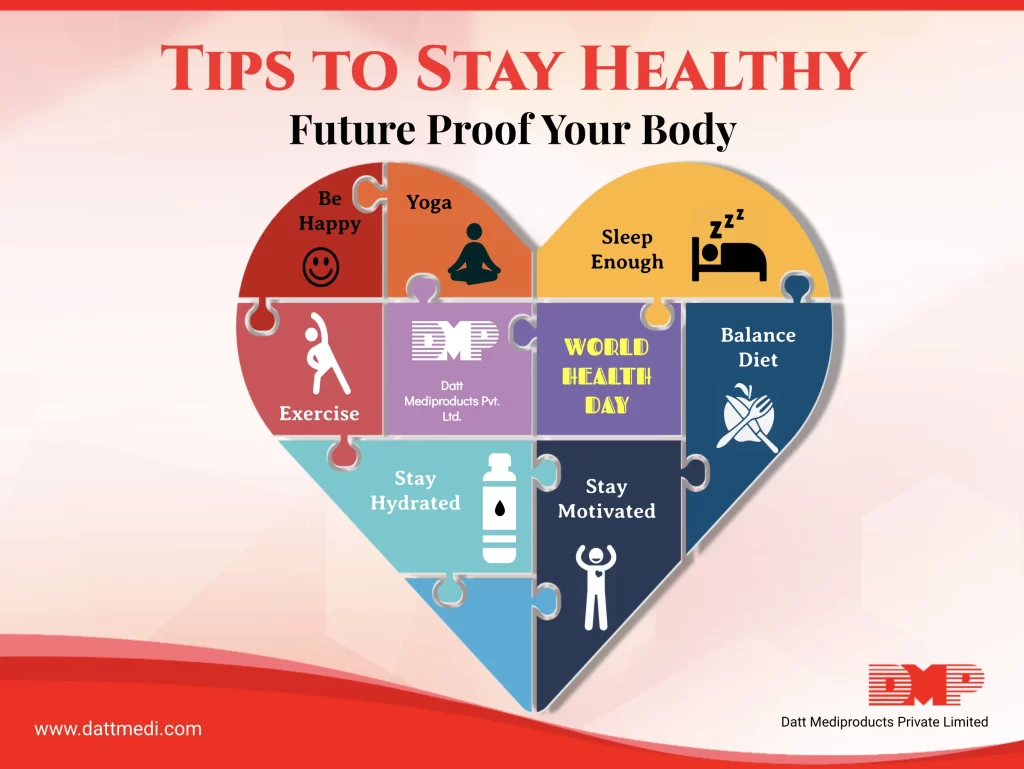
Maintaining a healthy body is a journey of events that are nurtured with various healthy habits.
We bring to you a compilation of some healthy choices you can make in your lifestyle to attain a healthier happier lifestyle.
EXERCISE DAILY:
A regular exercise routine helps to improve your health and relieve you from stress, frustration, anxiety, fatigue, and tiredness. Exercising for only 30 minutes to an hour on the daily basis is known to manage weight, stress and even balance hormones.
EAT A HEALTHY & BALANCED DIE 1.Eat colorful plate. Consuming food with a variety of colors (both vegetables and fruits) ensures a vibrant intake of nutrients, vitamins, minerals and antioxidants. 2.Check calories & Eat right portion if you don’t want to increase that measurement on your weighing scale. 3.Avoid inflammatory foods like trans fats, preservatives, refined sugars, processed meats can cause stomach inflammation and hence may be avoided. 4. Avoid high fodmap foods. These are fermentable carbohydrates that are poorly absorbed by the body and cause abdominal distress.
STAY HYDRATED:
– 70% of the human body is water and we need to stay hydrated to maintain the proper functioning of our body. Water is the most productive aid to hydration and it can’t be replaced. It’s our life source and absolutely essential for a long and lasting health.
– Water helps to flush out toxins, lubricate joints, reduce inflammation, improve energy levels, support metabolism, digestive system and mental performance as well.
CLEANSE YOUR BODY:
A varied intake of fruits and vegetables will ensure your daily antioxidants consumption, which are essential to remove free radicals from your body & reduce oxidative stress. It fortifies the immune system making you buoyant to various diseases and illness.
KEEP ASIDE ALCOHOL, SMOKING & LIMIT CAFFEINE:
Consuming alcohol, tobacco or smoking may appear to bring you some sort of relief but causes harm to your body in the long run. Quitting smoking/alcohol and limiting caffeine intake helps to increase your energy levels, immunity and hormonal balance.
TAKE CARE OF YOUR GUT:
A healthy gut is important for a healthier body. Your gut has good bacteria, which not only improve your digestive system but also help to build a strong immunity, treat a range of allergies, and is good for cardiac and mental health.
Probiotics: Consuming probiotics daily are known to help lose body fat and optimize health.
SLEEP ENOUGH:
It’s essential to unplug yourself from stressful daily activities and recharge your energy by sleeping. Studies have shown getting 7-9 hours of sleep on a regular basis can help improve mental health as well as physical health, from blood sugar to blood pressure.
DO YOGA & MEDITATE:
Connect your body, mind and soul with yoga or meditation. They help in many areas of your health some of which are keeping your mind sharp, lowering levels of stress and anxiety.
BE HAPPY:
Practice gratitude, accept what you have positively, and create happier feeling every single day. Make others happy, give them positive affirmations, show your happy feelings towards those who matter to you and spend more and more happy time with your loved ones. Your inner happiness will reflect in your outer radiance.
STAY MOTIVATED:
Address your inner feelings and emotions whether stress, unhappiness, dizziness or uncomfortable by seeking any kind of therapy like listening to music, writing journals, talking to friends/family, meditating or reading good books which help you keep going.
MAINTAIN HEALTHY & CLEAN SURROUNDINGS:
Clean your surroundings to keep the illnesses away whether allergies, infections or any other mental trauma. A clean environment brings clarity in thoughts and actions and peace in mind.
Follow us @ Datt Mediproducts for more such informative blogs and daily updates to stay healthy & fit. Because your health is your wealth.




